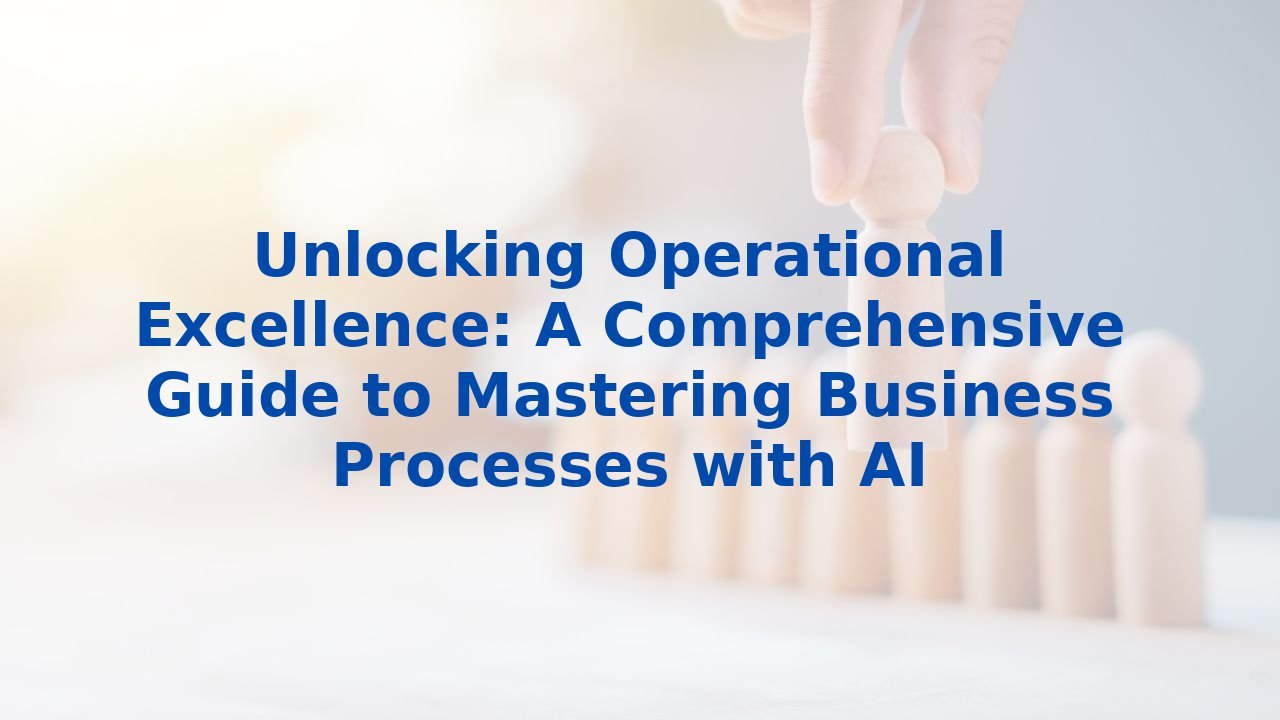Unlocking Operational Excellence: A Comprehensive Guide to Mastering Business Processes with AI
Unlocking Operational Excellence: A Comprehensive Guide to Mastering Business Processes with AI
In a landscape where every second counts, the quest for operational excellence has never been more vital. The fusion of artificial intelligence (AI) with business processes is not just an innovation; it’s a transformation. As organizations strive for greater efficiency and adaptability, AI emerges as a powerful ally that helps to streamline operations and unearth hidden potentials.
The Role of AI in Business Process Management
At its core, Business Process Management (BPM) is about optimizing business processes to enhance efficiency, effectiveness, and adaptability. AI plays a transformative role in BPM by introducing automation, improving decision-making, and facilitating better management of processes. By embedding AI in BPM, organizations can transition from traditional methods to a data-driven approach, one that reveals insights previously obscured by the chaos of day-to-day operations.
Enhancing Business Processes with AI
Process Discovery
Imagine AI as your organization’s detective, using data-driven techniques to uncover and analyze existing processes. This phase is crucial as it highlights inefficiencies that commonly elude human scrutiny. With the power of process mining, AI sifts through vast amounts of operational data, identifying patterns and workflows. By shedding light on these insights, organizations gain clarity, enabling informed strategies for improvement.
Process Mapping
Once processes are uncovered, the next step is mapping them out for action. AI excels in this domain, creating visual representations of workflows. By leveraging machine learning, AI not only documents processes but ensures that these maps are kept current. With an up-to-date process blueprint, organizations can address bottlenecks effectively, paving the way for operational excellence.
Process Automation
Perhaps one of the most significant contributions AI makes is in the realm of automation. Picture the mundane tasks you or your team spend hours on each week. Now, envision freeing up that time. AI can handle repetitive activities like data collection, invoice processing, and social media scheduling, allowing your top talent to engage in more creative and strategic tasks. The result? A more dynamic workforce focused on innovation rather than routine.
Process Management
Continuous monitoring is key to ensuring that processes run smoothly. AI systems can analyze historical data to detect emerging issues and alert management before they escalate. This proactive stance enhances decision-making through predictive analytics, enabling businesses to respond swiftly to trends and shifts in the marketplace.
Process Improvement
AI plays a pivotal role in the ongoing quest for improvement. Through data-driven insights, predictive modeling, and root cause analysis, AI identifies opportunities for optimization. This continuous cycle of assessment and enhancement not only leads to improved performance but reinforces a culture of perpetual growth and adaptation within the organization.
Benefits of AI for Improving Efficiency
Faster Decision-Making
The ability of AI to quickly analyze extensive datasets helps businesses make decisions faster and with greater confidence. In the fast-moving world of business, this agility can provide a critical competitive edge.
Enhanced Operational Efficiency
Automation leads to streamlined operations. With AI reducing manual effort and overseeing processes continuously, companies can significantly minimize waste and maximize productivity. This efficiency allows for a more strategic use of human resources.
Improved Resource Allocation
AI leverages existing data to optimize resource allocation, ensuring that organizations meet market demands without the pitfalls of overstocking or understocking. Smart resource management is key to operational excellence.
Risk Mitigation
By detecting anomalies in data patterns, AI equips organizations to proactively address potential risks. This anticipatory approach reduces the cost and effort associated with damage control and reinforces overall resilience.
The Importance of Training Employees for AI
While the advantages of AI are profound, realizing its full potential requires an equally strong emphasis on human capability. Training employees on AI tools is crucial for maximizing benefits, ensuring they can navigate and leverage these technologies effectively.
Understanding AI Capabilities
Knowledge is power. When employees understand AI’s capabilities, they can harness it to enhance their work processes. This knowledge is essential for maximizing the advantages of automation and data analysis.
Adopting New Technologies
Training fosters adaptability. Employees trained in AI are more inclined to embrace new technologies and integrate them into their workflows seamlessly, which is essential for staying relevant in an evolving market.
Enhanced Decision-Making
With proper training, employees can leverage AI-generated insights to make informed and strategic decisions, enhancing the organization’s overall operational efficiency and fostering a culture of growth.
In conclusion, the integration of AI into business processes is a gateway to operational excellence. By embracing AI in process discovery, mapping, automation, management, and improvement, organizations can unlock unparalleled efficiency and scalability. Yet, this journey doesn’t end at implementation; effective training is the cornerstone of allowing both the technology and your people to thrive together.



